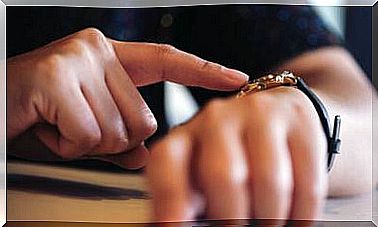How To Deal With Criticism From A Loved One?

We all face the mission of self-protection. An objective that is not limited to the physical plane, such as when we look before crossing the street or quickly withdraw our hands when burned with the oven. Our feelings, our self-esteem and our identity also demand protection. Therefore, when we receive criticism from a loved one, we can feel hurt and react in an inappropriate way.
This is one of the most discouraging scenarios, since if the reproach comes from a stranger or an enemy we can assume that it arises from envy or evil. However, when those hurtful words come to us from the mouth of someone who apparently loves us and seeks our own good, we become totally confused. What can we do in these cases? We explore it below.
Criticism or personal insecurity?
Under any circumstance, what is truly relevant is not the objective facts, but our way of perceiving and interpreting them. This is true. However, it is important that as a first step we stop to analyze if the criticisms we receive are really, or on the contrary, it is our susceptibility that leads us to see them in this way.
When we feel insecure, we can magnify or misinterpret the words of others, especially if they touch those points where we are most vulnerable. Thus, a neutral and unimportant comment can awaken us a hurt, fear or rejection of ourselves and lead us to overreact. For this reason, it is essential to know ourselves and work on self-image and self-esteem in the first place.

Different types of criticism
On the other hand, it should be noted that there are different types of criticism: those that focus on specific behaviors and those that judge us as people. The former can be enlightening, constructive and positive as they help us to identify inappropriate behaviors and attitudes. On the other hand, when we are prosecuted and labeled, not only do we fail to learn, but we can also feel deeply rejected.
If your partner, friends or family use derogatory adjectives to refer to you, let them know that this type of treatment causes you pain and you are not willing to tolerate it. Instead, ask them to state which specific acts they found wrong. We all make mistakes and they don’t define us: set limits on them.
The advice of those who do follow them deserve attention
Just as we can project our personal insecurity into the words of others, it is also common for others to project onto us their failures and their own character traits that they are not comfortable with. How many times has a selfish person accused you of being selfish? How many times does a person who cheats on his partner reproach his partner for his lack of fidelity?
Before taking the words of others as true and before following outside advice and recommendations, ask yourself where they come from. Is that person an example of what he preaches? Is it a role model for you? Is it really someone who cares about your well-being? If not, take their comments with caution.
Act or react
Beyond the way criticism from a loved one can affect you internally, it is also important to pay attention to how you respond to it. In most cases our first instinct is to get defensive, to absolutely deny what they accuse us of and even to fight back with hurtful words. However, this will only serve to generate a larger conflict.
It is important to learn not to react instantly and automatically, and to give ourselves time to reflect. Try to wait a few seconds before responding. If possible, pick up the conversation a few hours or a few days later, when you have been able to reflect. In this way you will be able to decide, deliberately, how you want to respond and you will not be prey to your emotions.

Criticism from a loved one can help us grow
No person likes to hear about their faults, flaws, and weaknesses. However, criticism sometimes holds an opportunity for personal growth. Regardless of whether or not the tone or words used were the most appropriate, perhaps the message you received will help you identify an area in which you can improve. If so, take what is useful to you and discard the aspects that only cause you conflict and pain.
In short, receiving criticism (even from our closest people) is inevitable. The key lies in the way we manage them. If criticism is constant and is delivered with harmful intent, set limits and stay away from that person if necessary.
Assertiveness is essential to protect yourself emotionally. However, remember that there may be a good opportunity to improve.









